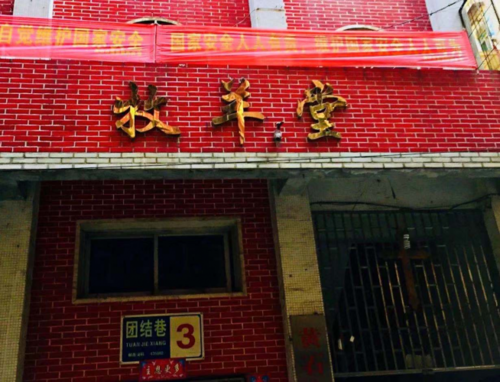In a recent blog post, Joann Pittman noted how facial recognition technology is “the newest thing that seems to be embedding itself into the fabric of Chinese society.” That technology now extends into some areas of church life as well. China Christian Daily recently reported that facial and biometric recognition technology is already being implemented in the church in Hubei. While many fear the potential abuse of such technology, one local pastor defends its use. Let’s listen in to their report.

Muyang Church in Huangshi, Hubei was said to have installed biometric devices to monitor the church attendance.
Facial Scan to Enter Church in Hubei Stirs Controversary, Local Pastor Denies Biometric Recognition for Gov't Surveillance
It's quite common that people in China have to have their faces and identity cards scanned before being allowed into high-speed rail stations, but the same approach has triggered controversies when used in some churches.
In the latter half of 2019, reports said that biometric devices had been set up inside some registered churches in Huangshi, a historic city in China's central Hubei province, including Muyang Church and Tian'en Church, and believers had to queue in line to have their fingerprints and faces scanned before being permitted to attend the service.
Local pastors and Christians have different comments about the matter. Two pastors in Huangshi responded that the report was true and gave their explanations.
One said that the devices were installed by the Huangshi China Christian Council and Three-Self Patriotic Movement (CCC and TSPM), not by the government. There were three reasons why it was necessary: to monitor church attendance in order to realize more attentive pastoral care and follow up with those who failed to attend services in time; to choose future workers and volunteers; and, to distinguish between non-local believers and strangers in order to guard against heresies.
Concerning the second point, the author raised a question. The pastor asked, "How could those, who could not guarantee their attendance, be workers?" He added, "It had been in use for two Sundays, but has been suspended due to the congestion resulting from too many believers."
A pastor from the Huangshi CCC and TSPM argued that biometric devices were established by the church to help refine its pastoral ministry and build up staff and volunteer teams, as well as provide statistics through a "punch card" system. "There is no other issue at all." He said that it was a first try, but was stopped after being found that it affected church order. In addition, he talked about the relationship between the local church and the government. "The local government cares about and supports our church."
Meanwhile, he denied those media reports that said that congregation members were required to "sign in," saying that they were never forced to fill in their information or not allowed to enter the church without fingerprints. "Believers are free to enter the church whether or not their fingerprints are collected. The government never requires that."
As to why fingerprints and facial recognition were optional, the pastor explained that publicity was carried out in the early stage of the execution that believers would be "not restricted, supervised or their personal information disclosed to any government; the act is not mandatory and completely voluntary."
Hearing the news, a sister of Muyang Church said that there was fingerprint and facial recognition equipment in the church and "it is still in use."
The explanation the church gave was that it was better to have statistics on the number in the congregation. She stated that some believers were willing to do it, but the majority of the congregation were not comfortable with it. Each time she held her face up to the machine, she "deliberately looked away." However, she said that the church never forcibly told the congregation to follow the instructions. "It is not only for statistical purposes, " she added.
Regarding the three purposes mentioned above, the laity and the clergy put forward different opinions. Although there was negative feedback from most local believers, some agreed that it was necessary for the church to consider more ways of refining pastoral care and it did not make sense if the basic information about volunteers and believers was unclear. Some claimed that based on the church's statement that the devices were to prevent strangers from entering, it was puzzling why non-local churchgoers and seekers had to conform to the rule.
A church worker pointed out that the measure was a waste of money, ineffective, and reduced security. The point was that it created mistrust. "The church really needs to reflect on it and repent."
The "punch card" system in the churches of Huangshi also raised questions among other pastors. A pastor in eastern China mentioned the problem of legitimacy. "Does the church have the right to collect fingerprints?"
Original Article: "Facial Scan to Enter Church in Hubei Stirs Controversary, Local Pastor Denies Biometric Recognition for Gov't Surveillance" by China Christian Daily
Edited and reposted with permission.
Image Credit: Sunset through the Lanterns, Guangxi, China by Chris Goldberg via Flickr.
Are you enjoying a cup of good coffee or fragrant tea while reading the latest ChinaSource post? Consider donating the cost of that “cuppa” to support our content so we can continue to serve you with the latest on Christianity in China.

